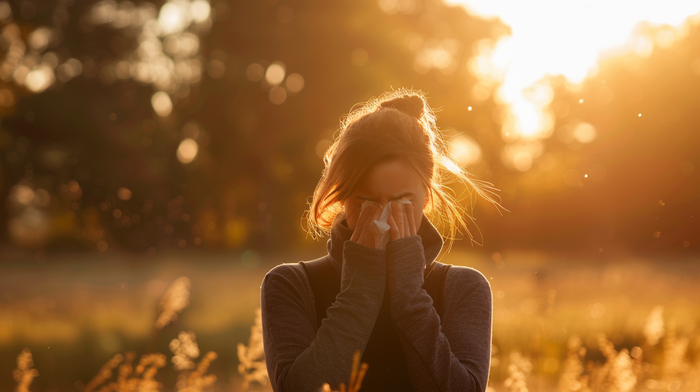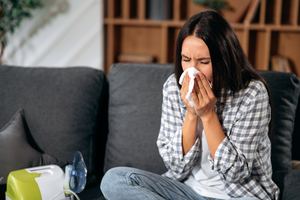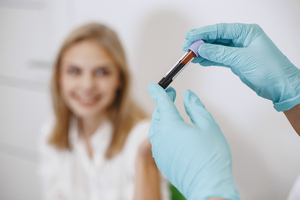Key points
- Morning allergies are common and often triggered by environmental factors like pollen, dust mites, and pet dander.
- Symptoms of morning allergies include sneezing, nasal congestion, itchy eyes, and fatigue.
- Preventive measures include using allergen-proof bedding, washing bedding often, and keeping indoor humidity low.
- Treatment options include over-the-counter antihistamines, nasal corticosteroids, decongestants, and allergy shots.
- Treatment options include over-the-counter antihistamines, nasal corticosteroids, decongestants, eye drops, home remedies, prescription medications, and immunotherapy, with a recommendation to see a doctor if symptoms are severe or persistent.

For most allergy sufferers, mornings can be rough.
Morning allergies are among the most common type of allergy, according to Healthline. From sneezing and congestion to itchy eyes and fatigue, morning allergies can make it challenging to start the day on the right foot. Continue reading to learn more about the causes of morning allergies and how to get relief.
What Causes Morning Allergies?
Morning allergies are common for people who have environmental allergies (sometimes referred to as hay fever). Common signs of morning allergies include stuffy nose, sneezing, nasal congestion, runny nose, and sinus pressure.
Morning allergies are often triggered by a variety of common environmental factors that can accumulate during the night, according to Healthline. These triggers can include substances commonly found in bedding, upholstery, and indoor spaces, as well as changes in environmental conditions such as humidity and temperature. Understanding what causes your morning allergies is important for finding the right treatments and alleviating symptoms.
Some of the most common triggers of morning allergies, according to Healthline, include:
-
Pollen
-
Dust mites
-
Pet dander
-
Mold
-
Perfumes and colognes
-
Acid reflux
What Are the Symptoms of Morning Allergies?
Common symptoms of seasonal allergies that are worse in the morning, according to Healthline, include:
-
Sneezing
-
Runny nose or stuffy nose
-
Itchy or watery eyes
-
Itchy throat or ears
-
Postnasal drip
-
Fatigue (feeling tired, or feeling like you didn't get enough sleep)
-
Coughing
-
Wheezing (more common in people with asthma)
-
Headache
-
Dark circles under the eyes (known as allergic shiners)
-
Impaired sense of smell or taste
- Nasal passages that feel plugged
It is important to note that some allergy symptoms are similar to symptoms of a head cold (also known as sinusitis). The best way to tell the difference is to check if you have a fever or if you have been exposed to anyone who is, suggests Healthline. Additionally, cold symptoms will get better after a few days, whereas allergy symptoms will usually continue until you are no longer exposed to the allergen.
How to Prevent Morning Allergies?
Preventing morning allergies is different for everyone, but may involve a combination of strategies to minimize exposure to allergens and create an environment with fewer allergen triggers for a restful night's sleep.
Some effective measures include the following, according to Healthline:
-
Using allergen-proof bedding covers.
-
Wash your bedding often and in hot water to kill mites and mold spores.
-
Bathe before going to bed at night so you can wash all the potential allergens off your body and hair.
-
Wear a clean pair of pajamas every night to limit the chance of being exposed to allergens on worn pajamas.
-
Keeping indoor humidity levels low to prevent mold growth. You can also use a dehumidifier if you live in a humid climate. Humidity below 50% is best.
-
Use air purifiers to reduce the number of airborne allergens.
-
Keep your windows closed during high pollen seasons.
-
If possible, replace your carpet with hardwood or laminate flooring.
-
Don’t sleep with your pets or allow them in your room.
-
Take an antihistamine before you go to bed at night.
-
Dust and vacuum your bedroom at least once a week.
-
Keep your room free of clutter that can attract rodents, bugs, and dust mites.
-
Sleep with your head elevated at least 6 to 8 inches to reduce the backflow of stomach acid if you believe acid reflux could be the cause of your morning allergy symptoms.
-
Have your home tested for mold.
-
Don’t spray any perfume or cologne in your room.
Treatment for Morning Allergies
There are several treatment options for you if you’re struggling with morning allergies. Some of the most popular options, according to Healthline include:
-
Over-the-counter antihistamines to reduce your allergy symptoms
-
Over-the-counter nasal corticosteroids to help with nasal congestion
-
Over-the-counter decongestants to help with nasal congestion and stuffy nose or running nose
-
Over-the-counter eye drops
-
Home remedies, including vitamin C, probiotics, local honey, and others
-
Prescription medications in the form of antihistamines and nasal corticosteroids
-
Immunotherapy, also known as allergy shots
When You Should See a Doctor for Your Allergies
If you experience severe or persistent allergy symptoms that are impacting your daily life, or if over-the-counter allergy medications are ineffective, seeing a doctor can help.
Morning allergies that interfere with your sleep, work, or school performance should always be evaluated by a healthcare provider. If your regular doctor is not available, you can go to urgent care for allergy relief. Find and book an appointment using Solv.
For a medical emergency, like allergy symptoms that make it difficult to breathe, dial 911 or visit your closest emergency room immediately.
FAQs
What triggers morning allergies?
Morning allergies are often triggered by environmental factors such as pollen, dust mites, pet dander, and mold.
How can I differentiate between a cold and morning allergies?
Cold symptoms usually improve after a few days, while allergy symptoms persist until exposure to the allergen ends. Fever is also more common with colds.
What are some ways to prevent morning allergies?
Measures include using allergen-proof bedding, washing bedding in hot water, bathing before bed, and keeping indoor humidity low.
What are the treatment options for morning allergies?
Treatments include over-the-counter antihistamines, nasal corticosteroids, decongestants, and prescription medications. Immunotherapy or allergy shots may also be considered.
When should I see a doctor for my morning allergies?
If your symptoms are severe, persistent, impact your daily life, or if over-the-counter medications are ineffective, you should see a doctor.









